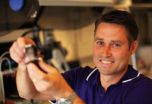(Press-News.org) (March 10, 2014) A healthy and balanced diet, as well as probiotics, have been known to be helpful in preserving gastrointestinal health for quite a long time. But it is only recently that the underlying mechanisms have become somewhat clearer. A rapidly increasing body of knowledge promises to further clarify the effects of our daily food on the gut microbiota and to indicate more targeted applications of probiotics in the near future. This was one of the topics presented at the Gut Microbiota for Health World Summit in Miami, FL, USA. On March 8-9, 2014, internationally leading experts discussed the latest advances in gut microbiota research and its impact on health.
"Diet is a central issue when it comes to preserving our gastrointestinal health, because by eating and digesting we literally feed our gut microbiota, and thus influence its diversity and composition," says the distinguished microbiota expert Professor Francisco Guarner (University Hospital Valld'Hebron, Barcelona, Spain). "If this balance is disturbed, it might result in a number of disorders, including functional bowel disorders, inflammatory bowel diseases and other immune mediated diseases, such as celiac disease and certain allergies. Also, metabolic conditions, such as type 2 diabetes, and perhaps even behavioral disorders, such as autism and depression, can be linked to gut microbial imbalances. Although a disrupted microbial equilibrium can have many causes — infectious pathogens or use of antibiotics among them — the role of our daily food and lifestyle is crucial. Thus, the maintenance of our gastrointestinal health is to a considerable extent in our own hands."
What makes probiotics beneficial?
What does this mean with regard to our daily diet? According to Prof. Guarner, an increased intake of foods with high amounts of animal fat, as well as of greasy and fried foods is not recommended, while a diet rich in vegetables, salads and fruits has proven to be beneficial to digestive health under normal circumstances. The same applies to fermented dairy products containing probiotics. These are defined by the World Health Organization (WHO) and the Food and Agriculture Organization of the United Nations (FAO) as live organisms which, when ingested in adequate amounts, confer a health effect on the host.
"The crucial challenge is to clearly determine which organisms are beneficial and exert a preventive or therapeutic effect. And for those that can duly be termed 'probiotics', the range of applications has to be defined more precisely than has been done so far," says Prof. Guarner.
However, he points out that important steps in this direction have already been made: "The mechanisms underlying the beneficial outcome of probiotics are becoming increasingly clear. Through different molecules, probiotics interact with the host via various mechanisms and pathways. Some probiotics, for example, can hold pathogens at bay: by improving the intestinal barrier function, they defend the host against disease-causing microorganisms trying to invade."
According to Prof. Guarner, further useful "services" of probiotics include strengthening the immune system by stimulating immune mechanisms inside and outside the gut, helping to regulate the gut motility, and acting as anti-inflammatory compounds in the gut, with an impact beyond the gut. A generally important ability of probiotics that affects various digestive disorders consists in improving the gut's microbial composition and preserving its stability. Meanwhile, medical societies, such as the World Gastroenterology Organisation (WGO) and the European Society for Primary Care Gastroenterology (ESPCG), have provided doctors with guidelines informing them about which probiotics have beneficial effects on which gastrointestinal conditions.
Useful already early in life
Probiotics have beneficial effects at all stages of life, including the very early ones. Professor Brent Polk (University of Southern California and Children's Hospital Los Angeles, California, USA) points to studies that show the beneficial effect of certain probiotics on gastroenteritis, colic, eczema, diarrhoea and necrotizing enterocolitis (a condition in premature children that leads to tissue death in parts of the bowel) in children. Moreover, according to several prevention studies, probiotics, such as the thoroughly investigated Lactobacillus rhamnosus, may support disease prevention in children who tend to have a reduced microbiota diversity as they are not breast-fed, have been exposed to antibiotics or are born via Caesarean section. In all these cases, the development of a rich and balanced gut microbiota is likely to be delayed or impeded.
As Prof. Polk points out, for the treatment of certain patients, such as immunocompromised individuals, who are prone to bacterium-associated infections, it can also be advisable to replace probiotic bacteria with probiotic-derived products. First achievements in this line of research have already been gained. Prof. Polk and his colleagues identified a probiotic bacteria-derived soluble protein (p40) from Lactobacillus rhamnosus, which they tested in mouse trials. They could show that the probiotic-derived substance prevented a certain form of cell death — induced by malfunctioning proteins that normally regulate the cells' growth and differentiation — in the epithelial cells of the colon. As p40 activates specific receptors in the intestinal epithelial cells, it protects the bowel from inflammation.
The microbial communities that reside in the human gut and their impact on human health and disease are one of the most exciting new areas of research today. To address the most recent advances in this rapidly developing field, scientists and health-care professionals from all over the world came together at the Gut Microbiota for Health World Summit in Miami, Florida, USA, on March 8-9, 2014. The meeting was hosted by the Gut Microbiota & Health Section of the European Society of Neurogastroenterology and Motility (ESNM) and the American Gastroenterological Association (AGA) Institute, with the support of Danone.
INFORMATION:
About the Gut Microbiota For Health Experts Exchange website
The http://www.gutmicrobiotaforhealth.com Experts Exchange, provided by the Gut Microbiota & HealthSection of ESNM, is an online platform for health-care professionals, scientists, and other people interested in the field. Thanks to being an open, independent and participatory medium, this digital service enables a scientific debate in the field of gut microbiota.
Connected to http://www.gutmicrobiotaforhealth.com, the Twitter account @GMFHx, animated by experts, for experts from the medical and scientific community, actively contributes to the online exchanges about the gut microbiota. Follow @GMFHx on Twitter. You can follow the Twitter coverage of the event using #GMFH2014
About the Gut Microbiota & Health Section of ESNM
ESNM stands for the European Society of Neurogastroenterology and Motility, a member of United European Gastroenterology (UEG). The mission of the ESNM is to defend the interests of all professionals in Europe involved in the study of neurobiology and pathophysiology of gastrointestinal function. The Gut Microbiota & Health Section was set up to increase recognition of the links between the gut microbiota and human health, to spread knowledge and to raise interest in the subject. The Gut Microbiota & Health Section is open to professionals, researchers, and practitioners from all fields related to gut microbiota and health. http://www.esnm.eu/gut_health/gut_micro_health.php?navId=68
About the AGA
The American Gastroenterological Association is the trusted voice of the GI community. Founded in 1897, the AGA has grown to include more than 16,000 members from around the globe who are involved in all aspects of the science, practice and advancement of gastroenterology. The AGA Institute administers the practice, research and educational programmes of the organisation. http://www.gastro.org
About Danone and Gut Microbiota for Health
Danone's conviction is that food plays an essential role in human health namely through the impact that the gut microbiota may have on health. That is why Danone supports the Gut Microbiota for Health World Summit and Experts Exchange web platform with the aim to encourage research and increase knowledge in this promising area, in line with its mission to "bring health through food to as many people as possible." http://www.danone.com
Feeding gut microbiota: Nutrition & probiotics are key factors for digestive health
2014-03-10
ELSE PRESS RELEASES FROM THIS DATE:
Lower IQ in teen years increase risk of early-onset dementia
2014-03-10
Men who at the age of 18 years have poorer cardiovascular fitness and/or a lower IQ more often suffer from dementia before the age of 60. This is shown in a recent study encompassing more than one million Swedish men.
In several extensive studies, researchers at the Sahlgrenska Academy of Gothenburg University have previously analyzed Swedish men's conscription results and were able to show a correlation between cardiovascular fitness as a teenager and health problems in later life.
Increased risk for early-onset dementia
In their latest study, based on data from 1.1 ...
Healthy eating may reduce the risk of preterm delivery
2014-03-10
In the study, which was conducted by researchers from the University of Gothenburg, Sahlgrenska University Hospital and the Norwegian Institute of Public Health, the participants completed a scientifically evaluated questionnaire about what they had been eating and drinking since becoming pregnant.
The researchers also had access to information about the women's general lifestyle e.g. level of education, living conditions, income, weight, physical activity, smoking habits, alcohol consumption, number of children and medical factors such as history of preterm delivery.
15 ...
Computer system simulates the behavior of tax evaders
2014-03-10
Tax fraud is a very serious problem for society, especially in Spain, where tax evasion represents almost one-fourth of its Gross Domestic Product. On the one hand, evasion is a problem because it produces a loss in public resources, something which is especially difficult in a time of economic crisis with cutbacks in public funding; on the other hand, tax fraud damages the effectiveness of justice within the tax system, since not everyone is able to evade taxes equally, thus leading to injustices between small and large companies and between the self-employed and employees. ...
New sugar-test to reduce false-positive cancer diagnoses
2014-03-10
The world's most widespread test for ovarian cancer reports false-positives in 94 of 100 diagnosed cases. Now, chemists at the University of Copenhagen working with clinical researchers at University College London have developed a method able to halve the number of false-positives. When fully developed, the new test will spare a significant number of women from unnecessary worry and further testing. Furthermore, global health care providers stand to save substantial sums – just by including a test on a certain sugar molecule in tandem with the currently prevailing diagnostic ...
There is no beating the breathalyzer this St. Patrick's Day (video)
2014-03-10
WASHINGTON, March 10, 2014 — If you're having some drinks this St. Patrick's Day weekend, remember to have a designated driver, otherwise you may end up on the business end of a breathalyzer on the side of the road. If you think you can beat it, think again; chemistry will land you in cuffs. In the American Chemical Society's (ACS') latest Reactions video, we examine how your breath can get you busted when you've had too much to drink. The video is available here: http://youtu.be/rvVzlg26bCM
Subscribe to the series at Reactions YouTube, and follow us on Twitter @ACSreactions ...
Europe must improve its response to the threat of plant pests and diseases
2014-03-10
Potentially devastating plant pests and diseases are highlighted in a new report from EASAC, the European Academies' Science Advisory Council, the leading provider of independent scientific advice to Europe's policy-makers. In the detailed EU-wide study of emerging plant pests and diseases, EASAC describes their combined threat to crops and forests and wider ecosystems, with implications for human health. In economic terms, as admitted by the EU Commission, billions of euros could be at stake and the environmental impact may be irreversible. Prof. Anne Glover, Chief Scientific ...
Young skin cancer survivors at risk of other cancers later
2014-03-10
Australian author on the paper, Professor Rodney Sinclair, Professor of Medicine at the University of Melbourne and Director of Dermatology at Epworth HealthCare said that the risk decreased significantly with increasing age, but it remains higher compared with individuals who have never had NMSC.
"The risk for developing any cancer subsequent to NMSC decreases significantly with increasing age: 23 times higher risk for those under 25 years of age; 3.52 for those 25-44 years of age; 1.74 for those 45- 59 years of age; and 1.32 for those older than 60 years.
Published ...
Rice synthetic biologists shine light on genetic circuit analysis
2014-03-10
In a significant advance for the growing field of synthetic biology, Rice University bioengineers have created a toolkit of genes and hardware that uses colored lights and engineered bacteria to bring both mathematical predictability and cut-and-paste simplicity to the world of genetic circuit design.
"Life is controlled by DNA-based circuits, and these are similar to the circuits found in electronic devices like smartphones and computers," said Rice bioengineer Jeffrey Tabor, the lead researcher on the project. "A major difference is that electrical engineers measure ...
New high-tech glasses detect cancer cells during surgery
2014-03-10
A team of scientists at Washington University School of Medicine in St. Louis (WUSTL) and the University of Arizona (UA) in Tucson led by Samuel Achilefu have created a pair of high-tech glasses that help surgeons visualize cancer cells during surgeries, which glow blue when viewed through the glasses.
Achilefu published the 2013 article he coauthored as part of a special section in the SPIE Journal of Biomedical Optics on fluorescence molecular imaging that details the development of the high-tech glasses (available via open access in the SPIE Digital Library).
Achilefu, ...
Where nothing grows anymore
2014-03-10
Jena (Germany) Vast fields of sunflowers, sprawling pine trees and slim cypresses, as well as vineyards as far as the eye can see – these are typical memories of Tuscany for all those who have been there. By contrast, Professor Dr. Beate Michalzik from the Friedrich Schiller University of Jena and her colleagues are interested in the more barren aspects of the region in Central Italy: In a study the Jena geographers analyzed the condition of the soil in the region known as 'Crete Senesi' between Florence and Grosseto, whose hills are typically characterized by erosion – ...




